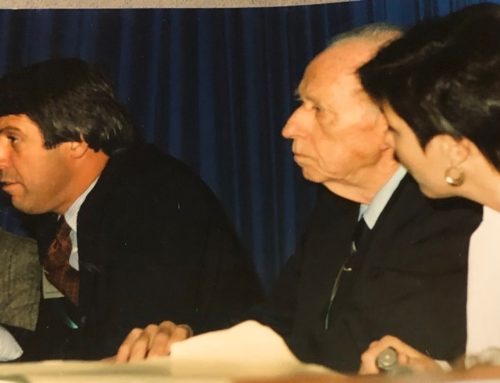By David Bork
Insurance. Do you have it? If your answer is “Yes,” then chances are you fully understand that there are calculated risks in life. In many countries around the world, drivers of automobiles are required to purchase insurance as a condition of receiving from the licensing agency, a license for their car. At a very minimum, the insurance must cover the other vehicle, should you be involved in an accident.
When you rent a car in a foreign country, the car rental company often requires that the renter purchase insurance to cover not only any damage to the vehicle but also the other car, should you be involved in an accident. The rental company knows there is a risk.
In family business there are many risks. Disagreement among the owners is one of such risk. No matter how amicable the relationships, sooner or later there will be a disagreement among the owners. It can be about direction of the company, distribution of profits, investment in a new business, sale of a portion or all of the business. The list of possible disagreements is as diverse and as long as the list of decisions to be made in business.
What to do? While the family patriarch is alive, he can resolve the matter simply by exercising his authority. He pronounces his decision and the matter is final. But what happens when the patriarch is gone and there is a dispute among his children? This is when a dispute resolution agreement comes into play. If the patriarch is wise, he will create this procedure while he is still active in the business and attach it as a requirement for his heirs to inherit shares in the family enterprise. That requirement states that as a condition of inheriting the shares, the recipient agrees to be bound by the dispute resolution procedure in the Shareholder Agreement.
What follows is one version of dispute resolution. Those who use it must make the necessary modifications to fit conditions in their family and comply with relevant corporate law. It is customary to create a Shareholder Agreement defining the process and conditions under which the owners will operate. Some version of these two sections, incorporated into your Shareholder Agreement, can prove to be invaluable in resolving differences and protecting the business from disruptive disputes or destructive decisions.
The language might be something like this:
This procedure applies to the process of the family “speaking with one voice” in various transactions. The Shareholders recognize that it is possible that at some point in the future they could be at impasse on a decision to be taken at the _____________ Family Holdings shareholder level. Further, it is the intent of the Shareholders to avoid shareholder litigation if at all possible.
For purposes of this agreement, impasse shall be defined as that situation wherein shareholder(s) representing more than X% of all the shares, declare that they are “At Impasse” on a particular matter.
Such declaration shall be communicated by that/those shareholder(s) within 72 hours of when the disputed decision is taken. The declaration shall be communicated in writing and be delivered to the other Shareholders in an official, documented manner. Registered mail is the preferred method.
Within two business days of receipt of such notice, the Chairman of _____________ Board of Directors shall engage an impartial third party who is a professional mediator to examine the details in the matter. The examination shall take place within 10 business days, with the mediator rendering his opinion within 15 business days of their selection. The mediator’s opinion will be delivered to all Shareholders in a meeting that has been arranged expressly for that purpose. If the shareholder(s) who declared the impasse is/are satisfied with the opinion, then the matter is finished. The mediator shall prepare a document reflecting the final decision and resolution of the matter. Initiating Shareholders must declare in writing, their acceptance of the mediator’s decision. Further, the mediator shall cause such a document noting their acceptance, be prepared and be available for signing at this meeting. All Shareholders shall be obliged to sign this
document.
Mediation is the first step in the process. Often, matters can be resolved in this manner and at this level. What happens if those who declared the impasse do not agree with the mediator? In such a case, the initiating shareholder(s) not satisfied with the decision, have 24 hours to give written notice to the Holdings Chairman and all other shareholders that they are invoking the arbitration procedure.
Arbitration
Here is possible language for the Shareholder Agreement that requires arbitration:
On receipt of the above notice requesting arbitration, the Chairman of the Board of Holdings shall give notice to al Shareholders that the specific matter has been referred to arbitration. All matters relating to arbitration shall be in accordance with the procedures set down by the relevant, pre-agreed upon, arbitration association. This includes selection of the arbitrator. The decision of the
arbitrator shall be binding on all signatories to this agreement, their heirs and assigns. No exception shall be made in the aforementioned binding commitment to the decision of the arbitrator.
International arbitration is the leading method for resolving disputes arising from commercial agreements and other international relationships. As with arbitration generally, arbitration is a creation of contract, i.e., the parties' decision to submit disputes to binding resolution by one or more arbitrators selected by or on behalf of the parties and applying adjudicatory procedures, usually by including a provision for the arbitration of future disputes in their contract. The practice of arbitration has developed so as to allow parties from different legal and cultural backgrounds to resolve their disputes, generally without the formalities of their respective legal systems. Agreement in advance to be bound by the decision of the arbitrator puts “teeth” into the shareholder agreement.
In my 45 years of serving family enterprise, in those cases where there was a shareholder agreement that included mediation and then binding arbitration, matters went to mediation but the arbitration provision was rarely used because the principals preferred to make their own decisions rather than put it into the hands of a third party.
That “pre-agreement” was insurance, like buying insurance when renting a car. Shareholders made the agreement in advance and when the dispute arrived, there was an agreed upon, effective method for resolution.
Does Your Family Business Need Help?
Family Business Matters has extensive experience assisting family businesses. With many decades of experience, we understand the wide variety of challenges that families face as they work together to build, grow and sustain a thriving family business generation after generation. Through conferences, continuing education programs, family business retreats, speaking engagements and private family business consulting services, Family Business Matters has assisted more than 450 family-owned businesses around the world chart their way through family business issues of all shapes and sizes.
Contact Us
For more information on how Family Business Matters can help your family business survive and thrive, please contact us today at (970) 948-5077.






